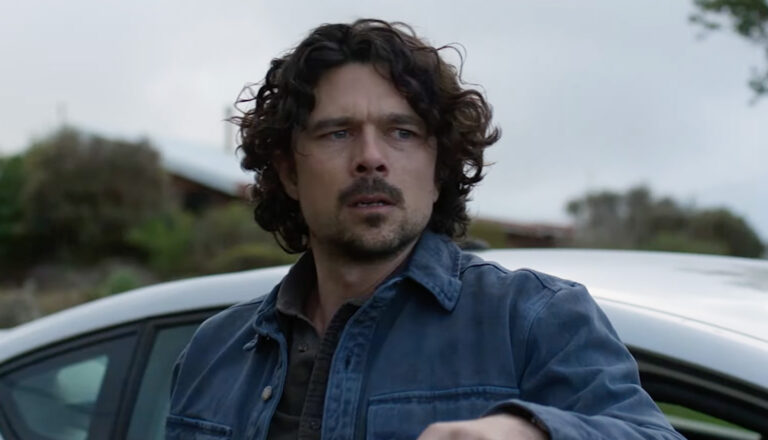
Scrublands
Scrublands’ Martin Scarsden is good at uncovering buried secrets, even when the secrets put his own life—and others’—at risk.

“Welcome to St. Denis Medical, the best hospital in the world!”
That’s what hospital administrator Joyce would love to say. She’d like to say they’re the best hospital in Oregon … as long as you don’t count any of those in Portland.
You see, St. Denis is a safety-net hospital, meaning its doctors and nurses provide healthcare to everyone, regardless of insurance or financial status. Sure, it puts a burden on their resources, but they care far more about treating every patient who needs assistance … even if they’re understaffed and underfunded.
But still, Joyce hopes that when a camera crew walks through those sliding-glass doors to film a documentary, they’ll be greeted with a smile. After all, Joyce says, smiles are the most infectious disease out there.
Just … don’t expect any of those from Supervising Nurse Alex, the workaholic control freak whose shift ended two hours ago. Oh, and don’t look at veteran Dr. Ron Leonard, whose long years working in the medical field make him far less likely to crack a joke. And maybe don’t ask for any smiles from the timid new nurse, Matt, either. He’ll probably just get confused and mess the facial movements up.
Hmm … who else?
I guess you couldget a smile from Dr. Bruce Schweitz, but it’s hard to tell if it’s a genuine smile or if he’s just acting as a charming and prolific main character for all the cameras.
Look. If you want smiles, maybe go to the dentist next time.
We’ve reviewed plenty of workplace comedies on Plugged In.
The Office. Parks and Recreation. Brooklyn Nine-Nine. Superstore. American Auto. Abbott Elementary. Animal Control. Blockbuster. Tires.
What was once a unique venture is now commonplace in comedy. Most come with mockumentary-style camera work; quirky, over-the-top characters; and situations that’ll more than likely be introduced and resolved in a single episode. And while a few of them succeed, most of them fail to catch on, quietly dying out like the struggling companies on which so many of them center.
It’s hard to tell what side of that fence the genre’s newest entry, St. Denis Medical, will fall.
Of all the series listed above, St. Denis Medical feels most similar to Parks and Recreation. It stars a kooky cast of characters who, though they solve (and usually cause) some issues around the hospital, genuinely hope to help patients feel better. Like Parks and Rec’s Leslie Knope, Supervising Nurse Alex is an overworked control freak who fears that her absence may literally cause the hospital to explode. But also like Leslie Knope, Alex is kind—a flawed character who longs to provide the best treatment to her constituents.
As you’d expect, the other exaggerated character types working alongside her, despite their flaws, feel likewise. So the tender, heartfelt moments that appear as suddenly as the show’s jokes can be really lovely, too.
But don’t ignore its vitals. St. Denis Medical, were it a patient, is still at risk of crashing.
Occasional sexual gags; references to drug use and abuse; and mild crude language appear in each episode (though harsh profanities are censored). Because this show takes place in a hospital, some storylines revolve around and include death. And unskilled new-hire nurse Matt, who originally hails from a small medicine-opposing “religious community” in Montana, occasionally references his religious upbringing as he learns medical practices—often as the butt of a joke.
St. Denis Medical, in my opinion, balances precariously between stabilizing and coding. And only time will tell which way the show’s health veers.
(Editor’s Note: Plugged In is rarely able to watch every episode of a given series for review. As such, there’s always a chance that you might see a problem that we didn’t. If you notice content that you feel should be included in our review, send us an email at [email protected], or contact us via Facebook or Instagram, and be sure to let us know the episode number, title and season so that we can check it out.)
https://podcasts.focusonthefamily.com/show/plugged-in-entertainment-reviews/tv-review-lego-pixar-st-denis-medical/
After her shift ends, Alex hopes to catch her daughter’s performance in a musical, but her controlling nature prevents her from leaving the hospital. Meanwhile, Joyce installs a new mammography machine to offer the “best breast test in the West.”
A patient’s rear is partially visible while he receives treatment for a wound. Another man walks around with his hospital gown on backwards, exposing his genitals to others (though for viewers, that area is pixelated). A woman pretends to have sex with a desk when she hears that a male nurse is being hired. When installing the mammography machine, Joyce hangs up a depiction of the uterus as well as an imitation breast on the wall.
The new nurse, Matt, was born in a “religious community” that didn’t believe in medicine—convictions that caused his brother to die from strep throat. Someone jokes about drilling holes in the heads of patients to release evil spirits.
Following an operation, light blood stains a man’s arms. We hear a reference to a patient who indulged in drug use. Someone tries to smoke.
God’s name is used in vain four times. We hear “a–,” “h—” and “crap” each used once. Characters also use heavier language, but those moments are censored and blurred.
Joyce, a strong advocate for the separation of professional and personal lives, has her beliefs tested when she receives bad news. Matt learns that most people are organ donors and considers whether he should become one, too.
A female patient wears a sports bra. Ron reveals that he’s attracted to younger women, but he flirts with an older woman to “expand his horizons.” Matt mentions dating a woman through the Internet, but he later learned that the “woman” was actually a man. Joyce reveals that she had feelings for a man, but she was never in a sexual relationship with him.
Matt worries about how becoming an organ donor might change his body in heaven. “I don’t want to be a giant Swiss cheese man,” he explains.
Alex treats a patient who has a nasty bruise on his leg. A couple of patients pass away.
A patient attempts to obtain drugs. Someone alleges that a patient’s kindness is an attempt to get opioids. Matt graphically describes how an organ donor’s eyes are removed.
Bruce keeps attempting to find admirable patients to show to the camera, but he keeps discovering problematic people instead. We meet a man who enjoys foreclosing on the homes of desperate couples and a racist man who is happy to “finally” get a white doctor.
God’s name is used in vain once. We hear “h—” said twice.


Kennedy Unthank studied journalism at the University of Missouri. He knew he wanted to write for a living when he won a contest for “best fantasy story” while in the 4th grade. What he didn’t know at the time, however, was that he was the only person to submit a story. Regardless, the seed was planted. Kennedy collects and plays board games in his free time, and he loves to talk about biblical apologetics. He’s also an avid cook. He thinks the ending of Lost “wasn’t that bad.”

Scrublands’ Martin Scarsden is good at uncovering buried secrets, even when the secrets put his own life—and others’—at risk.

Ironheart has your standard Marvel violence, but it also comes with crude language, sexual content and spiritual issues galore.

James and Astrid work through the woes, difficulties and joys of parenting their three children in Children Ruin Everything.

Netflix might not have banked on Squid Game being its most popular show ever. But it sure knew it wanted it bloody.